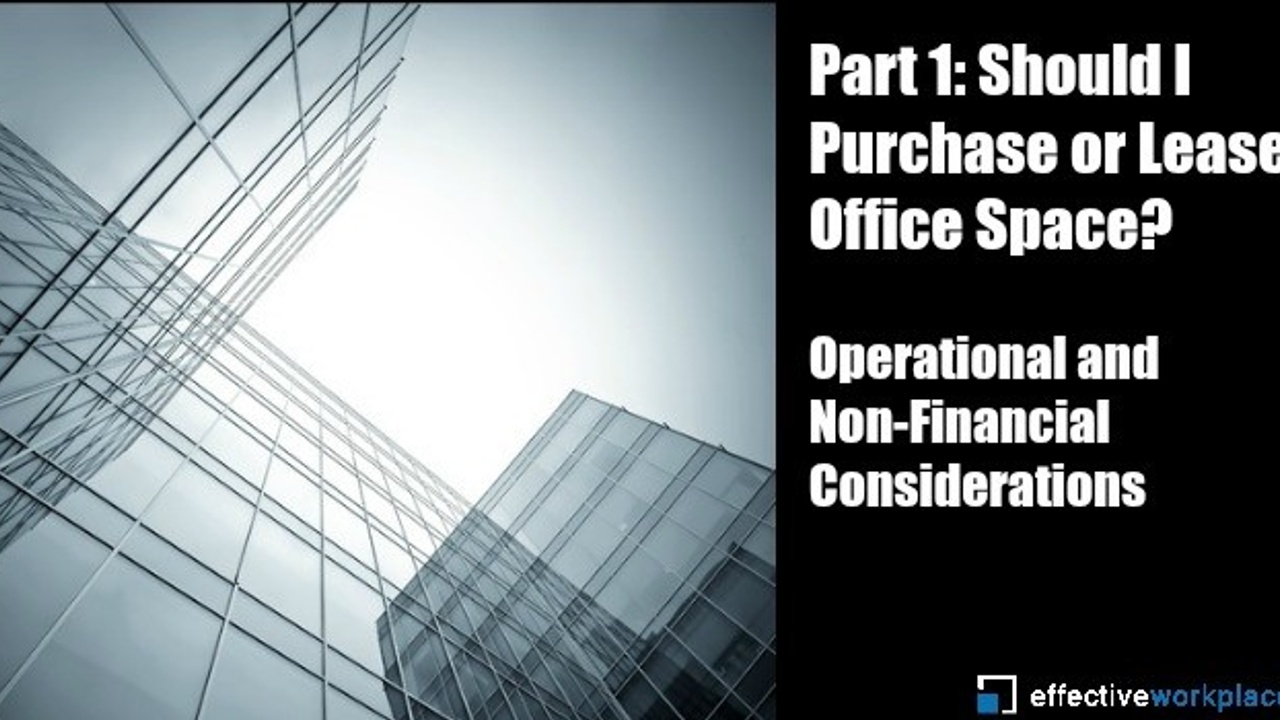
Part 1: Should I Purchase or Lease Office Space?
Oct 02, 2013Operational and Non-Financial Considerations
Every business owner and corporate office user, when evaluating their space requirements ponders the idea of purchasing their space/building vs. continuing to lease, especially now at this time in the commercial real estate cycle. Interest rates have been at historical lows and property values have been trading well below their replacement cost which make owning real estate attractive. However you want to have your business/corporate strategy leading the way as you evaluate this decision, not the conditions of the current cycle. (Reminds me of the psychology parallel, look inward, not outward.)
Should we own or should we lease our office needs to be more than just a financial decision and going into the process it's very important to have a keen sense of the best use of your company's capital. OK, now with your corporate strategy guiding the process and your business' investment returns forefront in your mind, let's look closely at the factors that will impact your decision.
When considering this decision, I recommend breaking down the process into three steps.
1) Highlight Operational Needs & Non-Financial Considerations
2) Analyze Financial Factors
3) Merge Your Findings, Run the Numbers, & Make a Decision
In Part 1 of Should I Purchase or Lease Office Space?, we'll focus on the key factors that are more operational in nature and are non-financially driven.
Growth
How do you expect your company to grow over the next 3, 5, 10 years? What spatial flexibility is required to meet your projections? These critical questions will impact your decision significantly as you consider purchasing v. leasing. For example, a healthcare provider may strongly consider purchasing for the ability to convert the asset to a state-of-the-art medical facility whereas a technology company that sees their headcount growing by 20% year over year will likely lean toward leasing.
Market/ Location
Location is always an important part of the discussion when considering real estate and office properties with the best access and situated close to mass transportation, retail, and area amenities are typically most sought after by the real estate investment community. So you will notice that the vast majority of inventory in the best locations are usually lease opportunities. What are the driving factors in your business that impact your desired location? Where are your team members and employees coming from and where are your customers based? How important is visibility (signage)? Be sure to have your search criteria detailed before starting to review the market so that you ensure you maximize the number of purchase opportunities.
Control
How important is it for you to make decisions related to the property and facility? When leasing space, you have to depend on the Landlord and/or Property Manager for all the building services. As an owner occupier, you will be managing and operating the building on behalf of the entire company or hiring a third party Property Management company. If the building you acquire has tenants or more space than you need for your business, your responsibility expands to being a Landlord, which we outline next.
Focus
Through ownership, you have to consider that your core business and focus will expand to include commercial real estate and the allocation of time, resources, and expertise need to be addressed. How do you expect your business and space needs will change over time and what is the exit strategy? As you answer these questions, you will have a clearer sense of the direction to take as you keep the real estate decisions aligned with your corporate strategy.
What drivers are critical in operating your business and how should the real estate component support these business objectives?
In our next post, let’s explore the factors that will have an impact on your company’s financial statements.

